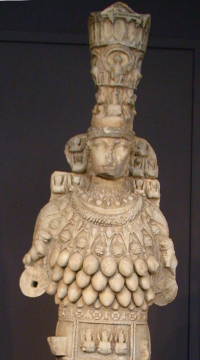Paul, in anticipation of his eventual departure from Ephesus, sends Timothy and Erastus into Macedonia before him (Acts 19:22). The events which had previously occurred have already shown us the great effects which his preaching had produced both among the Jews and Gentiles. The idolatrous practices of the Ephesian pagans were so far endangered by Paul and his preaching that the interests of one of the prevalent trades were seriously affected.
One of the idolatrous customs of the ancient pagan world, which Paul had to contend with, was the use of portable images or shrines, which were little models of the more celebrated objects of devotion. They were carried in processions, on journeys and military expeditions, and sometimes set up as household gods (Acts 19:21). The manufacture and sale of miniatures of the pagan goddess Diana (Artemis) or Ephesus' famous temple was a major contributor to the city's economy. It was an extensive and lucrative business (like the modern tourist industry) that made many people prosperous.
Few of those who came to Ephesus would willingly go away without a memorial of the goddess or a model of her temple made with gold, silver or wood. The wide circulation of these works of art over the shores of the Mediterranean, and many other places, made the worship of this pagan deity spread throughout the "whole world" (Acts 19:27).

During his three year stay in Ephesus, the Apostle Paul's character had risen so high as to obtain influence over some of the wealthiest and most powerful personages in the province. His preaching of the gospel, however, greatly impacted the sale of the city's pagan objects of worship and superstition. It was only a matter of time before those employed in the business of idolatry took notice of what was happening and decide that something needed to be done to save their livelihood.
An enemy arises
Resistence to the gospel and what Paul preached had been growing for some time in Ephesus (Acts 19:23). Demetrius, a wealthy silversmith who made silver temples for the pagan goddess Diana, finally took the initiative to rally his fellow craftsman against what was causing their businesses to falter (Acts 19:24). His speech before his fellow artisans was the following.
"Men, you know that from this craft we gain our wealth, and you see and hear that not only in Ephesus, but almost all of Asia, this Paul has persuaded a great multitude to turn away, saying that they are not gods which are made by hands.
"Now not only is our business in danger of coming into disrepute, but also the temple of the great goddess Diana, whom all Asia and the world worship, is in danger of being regarded as nothing, and her majesty also is about to be destroyed" (Acts 19:25 - 27, HBFV).
It is evident that Apostle Paul, though he had made no open and calumnious attack on the pagan divinities of Ephesus, had said something like what he had said at Athens. He almost certainly taught that we ought not to suppose that the true God of all is made with gold, silver or stone (Acts 17:29).
Demetrius appealed first to the self-interest of his hearers, and then to their carnal fanaticism. Such a speech could not be lost, when thrown like fire on such inflammable materials. The infuriated feeling of the crowd of assembled artisans broke out at once into a cry in honor of the pagan patron of their city and their craft. After hearing his message the people shouted with rage, "Great is Diana of the Ephesians!" (Acts 19:28).
A mob riots
Demetrius' speech leads the whole city into an uproar (Acts 19:29). It was indeed a scene of confusion. Never, perhaps, was the character of a mob more simply and graphically expressed than when it is stated, "the assembly was confused, and the majority of them did not know for what reason they had come together" (verse 32).
The mob, in their anger, seized Gaius and Aristarchus who had been travelling with Paul and rushed them to their theater (Acts 19:29). When the apostle discovered what had happened he attempted to travel to the theater and talk to the crowd. Fellow Christians, however, and even friends he had made of the chiefs of Asia, prevented him from taking such a dangerous action (verses 30 - 31).
The excitement of the angry multitude begins to wear out after after a few hours. The town clerk (one of the chief men of the city) further calms the rowdy pagan crowd with a short speech. He first reminds the people how famous is their temple and the deity it houses (Acts 19:35). He then warns them not to do anything reckless as the Christians they seized had not been guilty of approaching or profaning the temple, or of calumnious expressions against the goddess.
The clerk then instructs Demetrius and the pagan artisians that any dispute they have should be officially brought before a lawful court (Acts 19:38 - 39). He finally closes his speech with his greatest warning of all. He reminds the mob that their uproar could expose the city to the displeasure of the Romans since it was unjustifiable. Their continued tumultuous gathering endangered the public peace and would never be tolerated by Rome. The crowd, upon hearing these words, dispurses.
The pagans ultimately hastened Apostle Paul's departure from Ephesus, as it was no longer safe for him to live in the city. In the early winter of 57 A.D. he continues his missionary journey by revisiting the Macedonian and Corinthians churches he started just a few years prior.